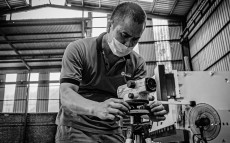- pathfindersAI
- Job Profile
Electrical and Electronics Installers and Repairers, Transportation Equipment
Summary
Electrical and Electronics Installers and Repairers, Transportation Equipment
What They Do
Electrical and Electronics Installers and Repairers, Transportation Equipment professionals play a crucial role in maintaining and ensuring the functionality of the electrical systems that are integral to transportation vehicles. Their expertise extends to a variety of transportation modalities including, but not limited to, aircraft, trains, automobiles, and marine vessels. These professionals are tasked with installing, maintaining, and repairing complex electrical and electronic systems, which can range from communication and navigation systems to lighting and engine control systems. They blend their knowledge of mechanics, electronics, and computing to keep transportation equipment operating safely and efficiently.
Job Responsibilities
The primary responsibilities of Electrical and Electronics Installers and Repairers in the transportation sector are multifaceted. They conduct routine inspections to diagnose faults and determine the condition of electrical systems, identifying potential issues before they escalate into major problems. Utilizing advanced diagnostic tools and equipment, they troubleshoot and repair electrical malfunctions, ensuring minimal downtime for transportation vehicles. Additional responsibilities include installing new electrical systems and components, adhering to both manufacturer specifications and regulatory standards. They also maintain detailed records of maintenance and repair work, ensuring compliance with safety protocols.
Essential Skills
Several essential skills are required to excel as an Electrical and Electronics Installer and Repairer in the transportation equipment field. First and foremost, strong analytical skills are necessary to diagnose and troubleshoot complex electrical issues successfully. Attention to detail is critical, as precise installation and repair work are paramount to the safety and functionality of transportation systems. Proficiency with diagnostic tools and technology is also required, enabling professionals to efficiently identify and rectify problems. Good manual dexterity allows for the handling of small components and tools, and solid communication skills facilitate collaboration with peers and comprehensive documentation. Additionally, a sound understanding of safety procedures and regulations ensures that work is conducted in a safe and compliant manner.
Educational Pathways
The educational pathways to becoming an Electrical and Electronics Installer and Repairer generally begin with a high school diploma or equivalent, with a strong emphasis on courses in mathematics, physics, and electronics. Post-secondary education often involves completing an associate degree or a technical certificate program in electrical or electronic engineering technology, which cover fundamental principles and practical skills. Hands-on experience through internships or apprenticeships is highly advantageous, providing real-world exposure and professional networking opportunities. Furthermore, some positions may require certification or licensure, particularly those involving specialized equipment or regulatory compliance. Continuous education and training remain pertinent throughout one's career to keep up with advancing technology and evolving industry standards.
Career Prospects
The career prospects for Electrical and Electronics Installers and Repairers in the transportation equipment industry are promising. As the transportation sector continues to grow and evolve, the demand for skilled professionals who can maintain and repair advanced electrical systems is anticipated to increase. Opportunities are available across various transportation sectors, including aviation, rail, automotive, and marine vessels, each offering unique challenges and environments. Additionally, with experience and further training, individuals can advance to supervisory or managerial roles, or specialize in niche areas of electrical and electronics systems, thereby enhancing their career trajectory and earning potential.
Conclusion
In summary, the profession of Electrical and Electronics Installers and Repairers, Transportation Equipment, is vital to the safe and efficient operation of transportation systems. With responsibilities ranging from routine inspections to complex repairs, these professionals ensure that critical electrical and electronic systems function correctly. Essential skills such as analytical thinking, attention to detail, and proficiency with diagnostic technology are crucial for success. The educational pathways typically involve specialized post-secondary training and practical experience, while the career prospects in this field remain robust and diverse. As the transportation industry advances, the demand for these skilled professionals will continue to grow, offering a rewarding and dynamic career pathway.
Video
Compensation
| State | Median Salary | Median Hourly | Positions |
|---|---|---|---|
| AL | 66,420 | 31.93 | 60 |
| AK | 46,570 | 22.39 | 30 |
| AZ | 75,310 | 36.21 | 140 |
| AR | 80,360 | 38.64 | 40 |
| CA | 81,890 | 39.37 | 790 |
| CT | 95,360 | 45.85 | 70 |
| FL | 67,740 | 32.57 | 260 |
| GA | 68,670 | 33.01 | 260 |
| HI | 54,080 | 26.00 | 60 |
| ID | 97,460 | 46.86 | 30 |
| IL | 82,790 | 39.80 | 180 |
| IN | 48,170 | 23.16 | 40 |
| IA | 79,390 | 38.17 | 70 |
| KS | 70,600 | 33.94 | 110 |
| LA | 67,800 | 32.60 | 180 |
| ME | 49,090 | 23.60 | 170 |
| MD | 73,730 | 35.45 | 620 |
| MA | 96,030 | 46.17 | 90 |
| MI | 62,250 | 29.93 | 160 |
| MO | 72,540 | 34.88 | 130 |
| NE | 80,080 | 38.50 | 380 |
| NV | 94,020 | 45.20 | 140 |
| NM | 40,960 | 19.69 | 50 |
| NY | 86,460 | 41.57 | 920 |
| NC | 75,850 | 36.47 | 60 |
| OH | 72,010 | 34.62 | 160 |
| OK | 50,960 | 24.50 | 90 |
| OR | 99,720 | 47.94 | 110 |
| TN | 54,680 | 26.29 | 160 |
| TX | 79,820 | 38.37 | 630 |
| UT | 79,610 | 38.28 | 30 |
| VA | 79,640 | 38.29 | 240 |
| WA | 100,150 | 48.15 | 220 |
| WI | 47,880 | 23.02 | 70 |
Similar Occupations
In this area you will find other occupations that are close to the one you were viewing in tasks, knowledge and work environment. If the primary job profile you are viewing isn't quite to your liking, take a look around and see what else is available.
Basic and Premium Accounts have more alternative occupations available than the Free account.

Avionics Technicians - 49-2091.00
An Avionics Technician installs, inspects, tests, and repairs the electronic systems used in aircraft, including navigation, communication, and flight control systems. They ensure the functionality and safety of these systems by performing regular maintenance checks and troubleshooting any issues that may arise.
-
$77,420/yr
Median Pay -
21,280
Number of Jobs

Calibration Technologists and Technicians - 17-3028.00
Calibration Technologists and Technicians are responsible for testing, maintaining, and adjusting precision instruments and equipment to ensure their accuracy and functionality. They meticulously calibrate a variety of devices, ensuring they meet established standards and specifications necessary for optimal performance.
-
$62,790/yr
Median Pay -
13,220
Number of Jobs